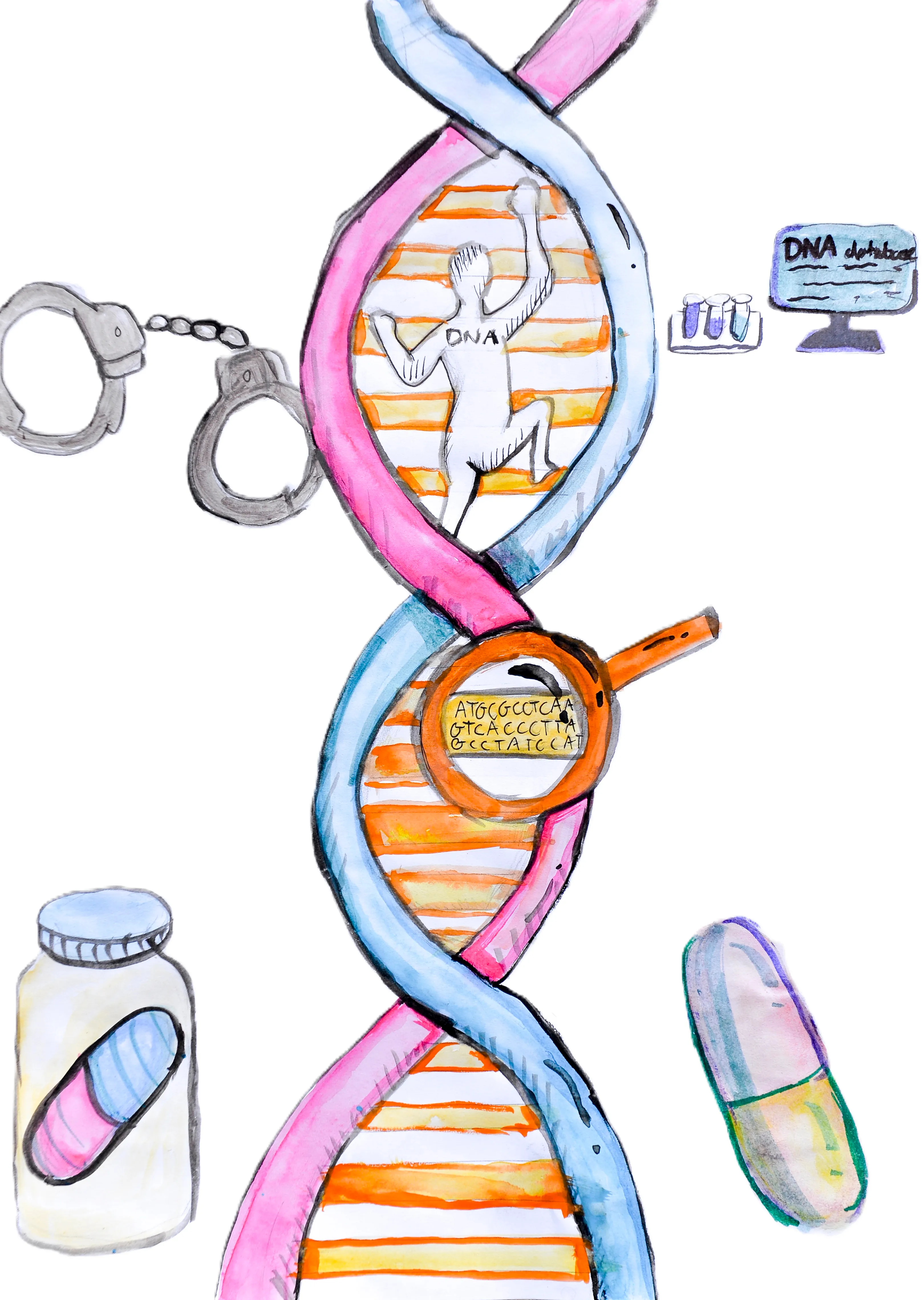
Is the Future in Your Hands?
Society Editor Poppy Rendell, LVI, debates the idea of creating an international database of DNA.

Poppy Rendell
Society Editor, 2025
Artwork by William Rayman
Senior 7
What if your DNA could help cure disease - or convict a killer? But what if it also led to a wrongful conviction?
When the subject of DNA testing arises, it would be remiss of me not to mention that a worldwide data base would cause crime levels to plummet. DNA is one of the most conclusive ways to convict someone of a crime, especially in the UK, where 75% of cases with DNA evidence lead to a plea or trial, compared to just 33% without it. However, it can be hard to find a matching DNA sample, as the police only have the authority to take a DNA test from someone that they have arrested. This means that, unless someone’s DNA is already on record for a prior offence, the police need to have lots of other physical evidence linking that person to the crime in order to arrest them. Were we to have an international database, the police would simply need to find a DNA sample from the crime scene and run it through the database. But, even the 0.1% error rate could wrongfully implicate millions, raising serious ethical concerns. This percentage may not seem alarming, but it really is. If 1,000 samples are checked then only 1 match may be wrong, but when we consider this on a larger, more global scale, of 8.2 billion people, the margin of error jumps to 8.2 million people’s DNA being incorrectly matched to a crime scene. Obviously, there will be some people with a matching DNA sample who won’t be counted as a suspect (because they have an alibi, no motive etc.), yet it still creates an uncomfortable ethical dilemma where we now have to consider whether we accept the fact that a few people may be wrongly convicted, or whether we value the lives of the many people that can be helped by having this database.
DNA testing can also benefit medicine. The effects of a database with everyone’s DNA can have positive ramifications for the future. With a compiled DNA information, scientists will be able to identify patterns on which genes cause certain diseases. They will then be able to analyse the genetic makeup of two people with the same illness and compare them to find a likely cause for the affliction. It could enable earlier diagnosis and save lives. Though some people may not approve of this, as the opportunity to check your DNA to find out about future illnesses may appear frightening and intimidating. Knowing that someone, somewhere has read your file and knows that you are at high risk of developing a disease would not be a welcome thought. Religious beliefs also complicate matters as some faiths view DNA testing as ‘playing God,’ so forcing participation could violate religious values.
It is all well and good discussing the hypothetical morals of DNA testing, however, how would this plan be made into a reality? There would need to be lots of regulations and checks to ensure that the DNA being registered is the actual DNA of the recorded individual. In the first solved case of DNA testing, murderer Colin Pitchfork paid someone to take his DNA test for him, in an attempt to escape conviction. Fortunately, he gossiped about this fact too loudly in a pub and was arrested by the authorities. To prevent this, you could have this sample taken at birth, but some families might object to their children’s DNA being taken. This isn’t even considering the expense of taking samples and constantly updating the database every time there is a birth. Creating a global DNA database would require secure storage, massive funding, and regular updates. Countries with fewer resources might be left out, and privacy becomes a major issue because DNA reveals sensitive information, from appearance to health risks. Any breach would have serious consequences.
Overall, I believe that an international database is needed, as it would benefit so many people, both through medicine and to help with crime prevention. But success is only possible if we build it with strict safeguards, privacy protections, and ethical oversight.